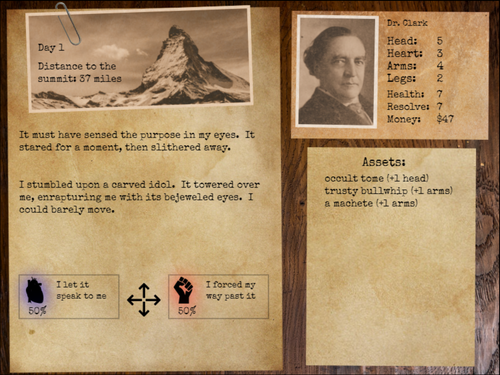Spooky Mountain Breakdown (Postmortem)

MiniJam #52. The theme was “Summit.” When the jam started, the revealed limitation was that the game could only use WASD or the arrow keys as inputs.
I knew what kind of game I wanted to make, going in -- a turn-based game with a small number of stats and choose-your-own-adventure style progress through a sparsely-written story. A lot of the stuff I make works like this -- I realized in thinking about it that most of my games could be described as “genre fiction finite-state machines.” It was unlikely that the theme would force me to change my plans, since I could work a bunch of fantastical prose into basically any setting.
The limitation, however, wound up making this game different and better than what I was expecting. Forcing me to think of the choices as four distinct categories of thing that were thematically linked regardless of the current circumstances made it much easier to come up with a structure and fill it in with content.
I wanted it to look better than my stuff normally does, so I spent a good chunk of the first day working on the layout and presentation. I think it worked out okay, that sore thumb of a paperclip notwithstanding. At the end of the first day I had the basic systems in place and more or less looking the way they did at the end.
I also wanted to do something that used Javascript’s weird thing where a function can be assigned to a variable. I guess it’s not that weird, as programming concepts go, it’s just a thing I think of as being beyond me because I’m not a strong programmer. I’ve been trying to use these games to learn specific things that have been confusing to me in the past, and this was one of them. Chris Moyer helped me understand the syntax, and I was able to use it to embed most of the game progression logic in the same data set that contained the text content. This made it a lot easier to build the content.
I’d been playing a ton of the Arkham Horror card game from Fantasy Flight. It’s designed to support solo play, which works well in a quarantine. You build a deck and play through campaigns made up of sets of scenario cards. It’s true to the Lovecraft source material -- it’s thematically bleak and difficult to win. The thing I find the most interesting about it is the way it supports player stories. I like board games where players can bring light role-playing or storytelling elements to the table -- Betrayal at House on the Hill is pretty good for that, and I think it’s the most compelling thing about Gloom.
Arkham Horror does something really clever with its events -- the narrative content of a given bad thing that happens to you is usually just a couple of words. “Crypt Chill” makes you discard an asset, and assets can be guns, or allies, or training you’ve received. When this event happens, it prompts you to imagine why you lost this particular thing, in this particular place, because of the cold. Playing it alone eliminates the self-consciousness I would normally have about off-the-cuff storytelling, and really makes the whole thing feel like a solo pen-and-paper RPG.
I’m still mulling over how you’d make a video game that was mostly about this feeling, so Arkham Horror’s influence on this game was more thematic than structural. Although I did basically copy the four stats across directly from the card game, replacing its Will with Heart because that meant there was a reason for it to be on the left side.
I’m trying not to lean on content-heavy games for these jams, but I figured it’d be okay in this case because the content is all very short sentences, and I can crank out that kind of writing pretty quickly and with fairly even quality. In my experience, spooky stuff works better when it’s short, and leaves more room to absorb fear from the reader’s imagination. That fear is better for them than the writer’s fear would be.
I still wound up procrastinating finishing the writing. This is the first time that has happened on one of these jam games -- I’m usually pretty excited about it for the duration. I think this is because the balance of the work was tilted so far towards the content side, and a few hours spent writing content isn’t as much fun as the first few hours of programming on a new project is. I should keep this in mind for future jams.
Spooky Mountain
An ascent into madness. Made for MiniJam #52.
| Status | Released |
| Author | ZapJackson |
| Tags | Narrative |